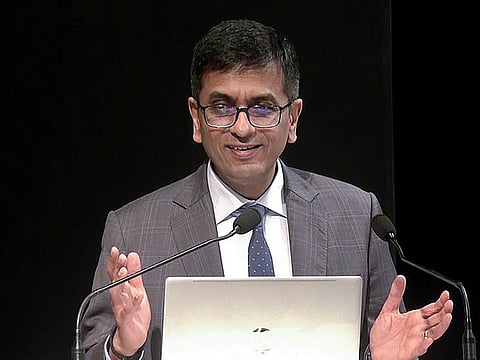

The Chief Justice of India (CJI), DY Chandrachud, stated today, September 28 that the justice system, from police stations to courtrooms, has to understand and respond to the compounded vulnerabilities of disabled children.
Speaking at the ninth National Annual Stakeholders Consultation on Child Protection, the CJI stated that the challenges faced by people with disabilities go far beyond physical accessibility; they must also deal with deeply ingrained societal biases, stereotypes, and misconceptions that pervade nearly every aspect of life.
The CJI also launched the Handbook Concerning Persons Disability Rights of the Supreme Court at the Consultation.
In his inaugural address, he stated that the theme of the year was "close to his heart" as a foster parent to two girls with disability. He recalled the difficulties that children with disabilities endure and the high cost of medical tests, treatment, and equipment.
"As someone who fosters two wonderful young daughters, I am reminded daily of the joy, purpose, and love they bring into my life. They have transformed not only how I see the world but also how I engage with it — strengthening my commitment to creating a more inclusive society where every child, regardless of their abilities, is cherished and protected," said the CJI, according to LiveLaw.
The CJI underlined four critical aspects of disability-friendly laws that require immediate attention from the judiciary and policymakers — identifying the problem, determining if we have a strong framework for promoting access to justice for children with disabilities, capacity building, and last, concerns of intersectionality.
"We must ensure that the justice system, from the police stations to the courtrooms, understands and responds to the compounded vulnerabilities of these children. The incorporation of restorative justice approaches is one such solution,” he said.
Talking about existing laws, he added, “The JJ Act (Juvenile Justice Act) outlines various rehabilitation and reintegration measures for children in conflict with the law such as counselling, education, vocational training and community service. For children with disabilities, these measures can be adapted to ensure they receive the specialised support they need to thrive.”
The two-day programme was organised by the Supreme Court's Juvenile Justice Committee in collaboration with United Nations International Children's Emergency Fund India. Juvenile Justice Committee Chairman Justice BV Nagarathna, UNICEF India Representative Cynthia McCaffrey and Annapurna Devi, Union Minister For Women And Child Development were also a part of the Consultation.
